Since Toshiba’s acquisition of OCZ back in early 2014, the company has turned the focus of OCZ’s line of SSDs to consumer-driven solutions. The Toshiba OCZ VX500 Series continues this trend as their newest mid-range family of SSDs designed for mainstream users looking to upgrade their PCs or notebooks to a solid state-based setup. The VX500 series is a direct successor to the Vector 180 line, and offers more or less the exact same features. Toshiba does claim, however, that the VX500 boasts higher endurance due to its MLC NAND and is designed specifically for write-intensive environments.
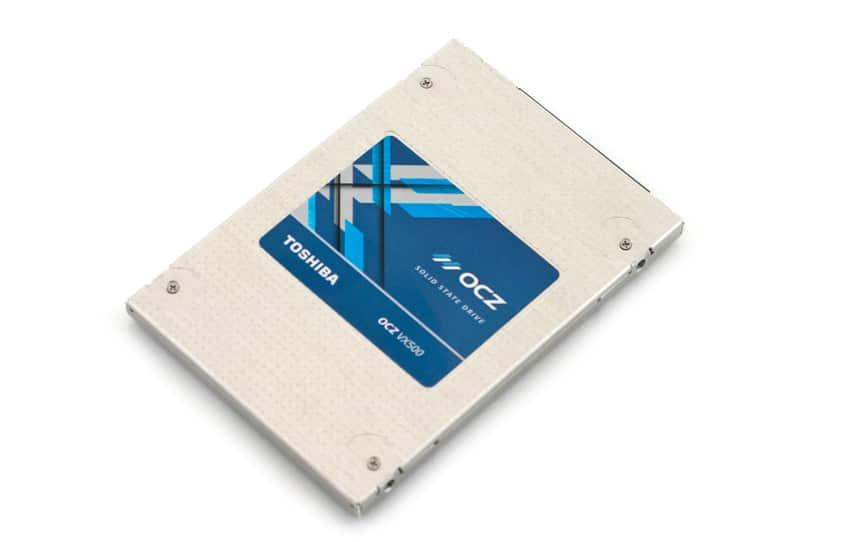
When it comes to the specifics of its performance, the OCZ VX500 is quoted with speeds that are slightly under the Vector 180 SSDs with sequential reads and writes up to 550MB/s and 515MB/s (compared to its predecessor’s 550MB/s read and 530MB/s write), respectively, while random read and write throughput are expected to reach 92,000 IOPS read and 65,000 IOPS write.
Like the recent OCZ drives before it, the VX500 also features the incomparable 5-year ShieldPlus warranty plan, which is designed to eliminate the headaches that are usually inherent of support and warranty claims. Users simply need to provide their serial number (no original purchase receipt required), and if that drive is deemed to be defective, they will receive a brand new VX500 SSD right away. There is really nothing quite like this plan as far as consumer SSDs go.
The VX500 SSDs are available in 128GB, 256GB, 512GB, and 1024GB priced at roughly $64, $4, $153, and $337 respectively. We will be looking at the 512GB model for this review.
Toshiba OCZ VX500 Specifications
- Interface: SATA 6Gbit/s
- Flash Components: MLC
- Capacities: 128GB, 256GB, 512GB, and 1024GB
- Performance:
- Sequential Read: Up to 550MB/s
- Sequential Write: Up to 515MB/s
- Random Read: Up to 92,000 IOPS
- Random Write: Up to 65,000 IOPS
- Endurance: 74 ~ 592 TBW
- Warranty: 5 Years
Design and build
The VX500 sports a completely different design compared to previous OCZ consumer drives. Instead of the using the entire enclosure for the branding, the new SSD uses a smaller sticker placed in the center of the metal chassis, which has all the Toshiba and OCZ branding in addition to the product name.
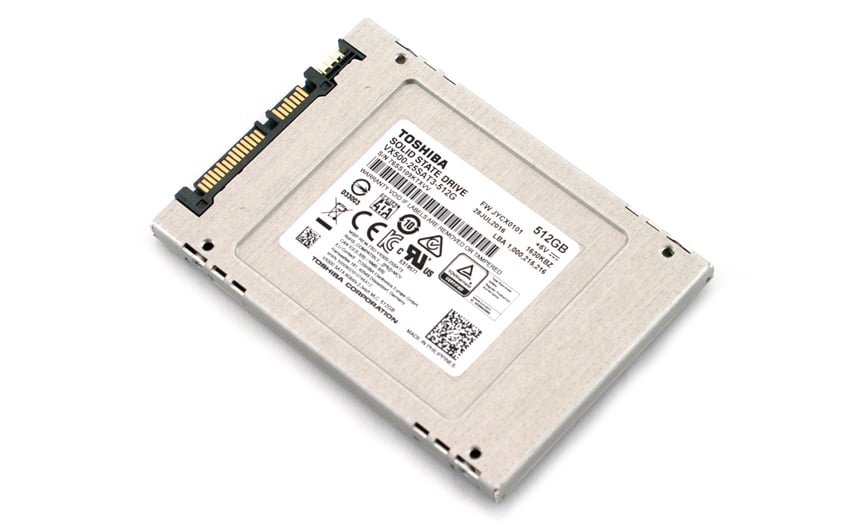
The VX500 also uses crisp edges rather than the smooth, rounded design that was used in the past.
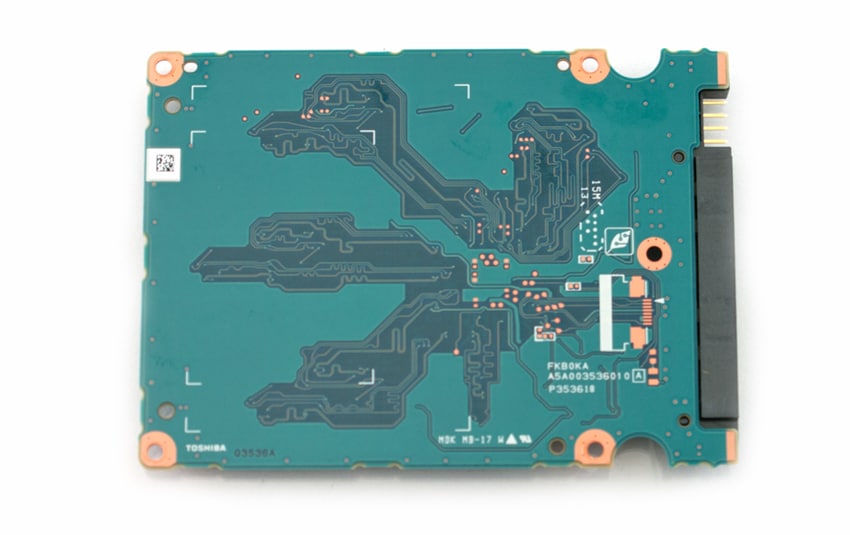
The VX500 leverages a 7mm 2.5-inch form-factor and can be used in a wide range of applications including notebooks and desktop PCs. The front of the drive has the standard SATA power and data interface while service and firmware upgrades are completed through the OCZ Toolbox.
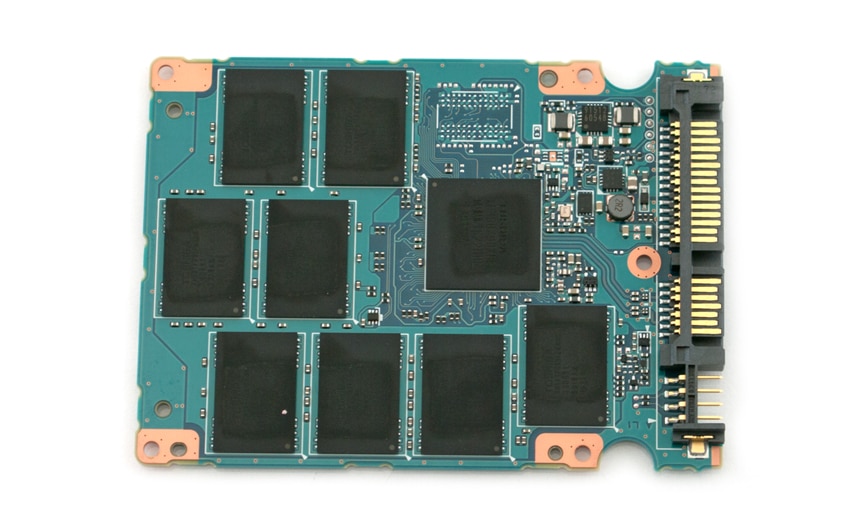
To open the cover, simply remove each of the four screws (located at the corners of the drive) and pry up the cover open revealing the singled-sided PCB. The VX500 is equipped with a Toshiba controller as well as eight pieces of Toshiba MLC NAND, which is tightly packed across the board.
Consumer Synthetic Benchmarks
All consumer SSD benchmarks are conducted with the StorageReview HP Z640 Workstation. We compared the Toshiba OCZ VX500 SSD to other high capacity consumer drives, the drive are the following:
- Samsung 850 Pro 1TB (SATA, 6Gb/s, Samsung MEX controller)
- Samsung 850 Pro 2TB (SATA, 6Gb/s, Samsung MEX controller)
- Micron M600 1TB (SATA, 6Gb/s, Marvell 88SS9189-BLD2 controller)
- SanDisk Extreme Pro 1TB (SATA, 6Gb/s, Marvell 9187 controller)
- Crucial MX200 1TB (SATA, 6Gb/s, Marvell 88SS9189 controller)
- Crucial MX200 500GB (SATA, 6Gb/s, Marvell 88SS9189 controller)
- OCZ Vector 180 480GB (SATA, 6Gb/s, OCZ Barefoot 3 M00 controller)
- OCZ Vector 180 960GB (SATA, 6Gb/s, OCZ Barefoot 3 M00 controller)
All IOMeter figures are represented as binary figures for MB/s speeds.
Our first test measures 2MB sequential performance. Here, the OCZ VX500 512GB performed very well with 497.4MB/s read and 455.5MB/s write, placing it among the leaders. The Samsung 850 Pro 1TB had the best overall results with 498.8MB/s read and 467.14MB/s write.
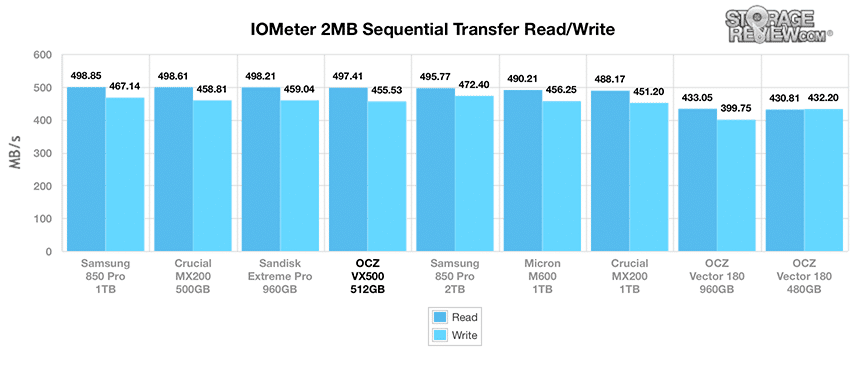
When looking at 2MB random transfer performance, the OCZ VX500 fell behind a bit with 477.7MB/s read and 453.2MB/s, which placed it near the bottom of the pack.
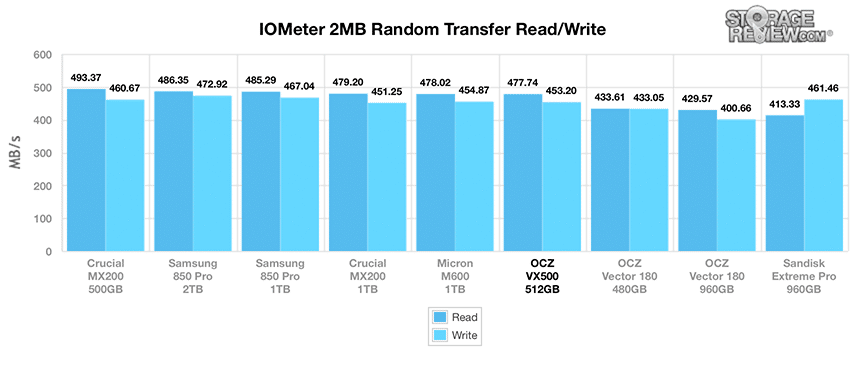
Switching to smaller 4K random transfers, the OCZ VX500 measured just 4978.3 IOPS read and 26,205.9 IOPS write, a significant hit in performance. In comparison, the next best drive (OCZ Vector 180 480GB) recorded 7690.3 IOPS read and 30,268.2 IOPS write.
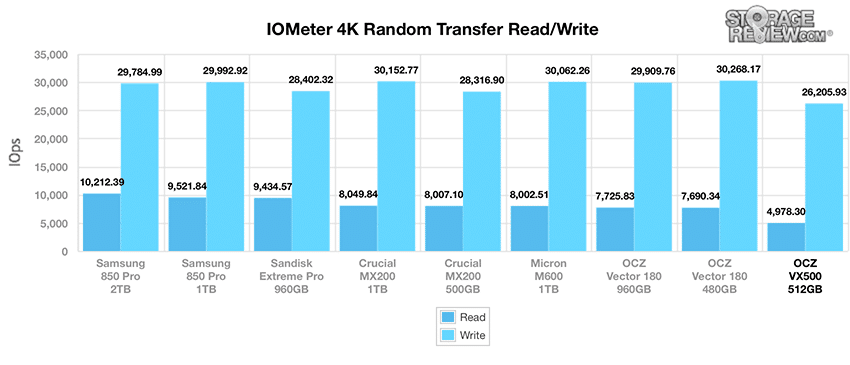
Looking at 4K random transfers in MB/s told a similar story, as the OCZ VX500 found itself at the bottom of the leaderboard once again with reads and writes of 19.4MB/s and 102.4MB/s, respectively.
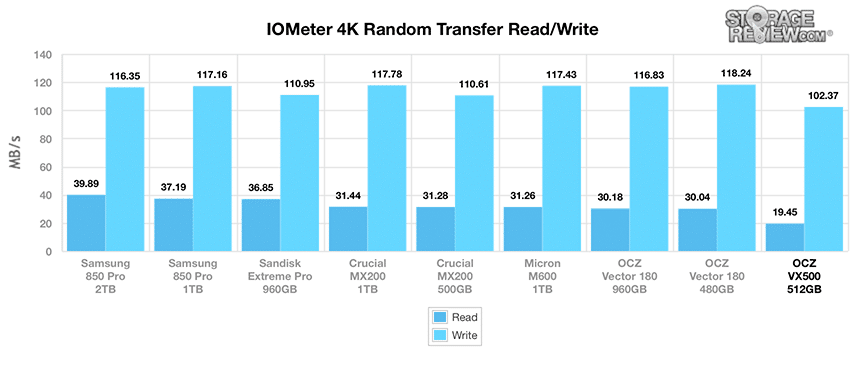
In our 4K write latency tests, the OCZ VX500 posted 0.038ms in average latency and 9.807ms in max latency. The best overall drive here was the Crucial MX200 1TB (0.0329ms in average latency) and the Samsung 850 Pro 1TB (0.1807ms in max latency).
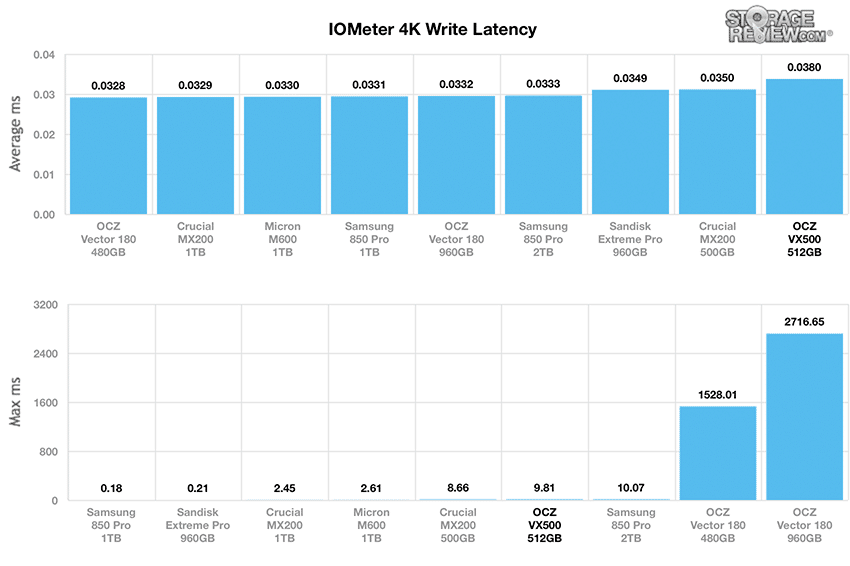
In our next 4K test, we move to a workload with 100% write activity, which scales from 1QD to 64QD. The OCZ VX500 512GB continued to fall behind with a range of just 26,767.37 IOPS in burst and 59,017.84 IOPS in the terminal.
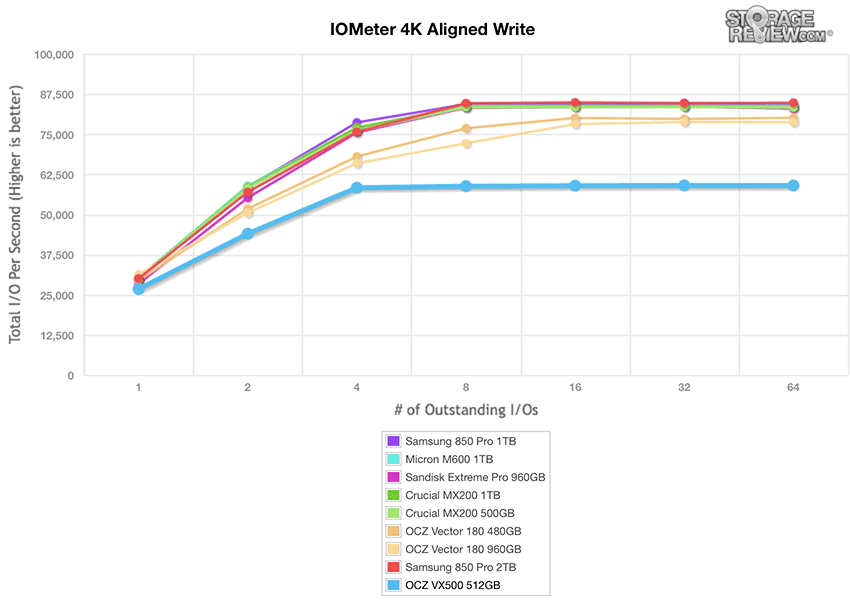
Switching to aligned read showed a vast improvement in performance. Here, the OCZ VX500 drive recorded a range of 5,400.21 IOPS at 1QD and 92,943.11 IOPS at 64QD, placing it in the middle of the pack.
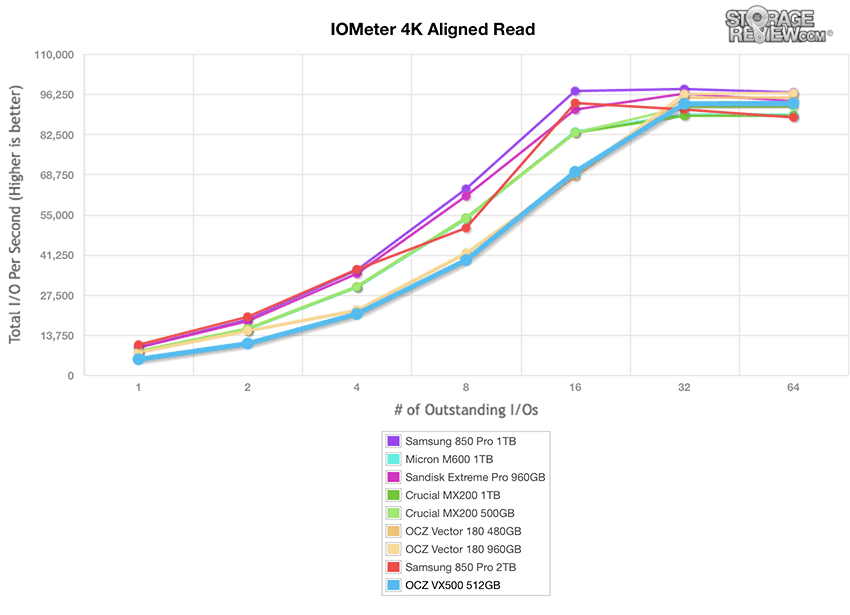
Our last series of synthetic benchmarks compare the hard drives in a series of server mixed-workloads with a queue depth of ranging from 1 to 128. Each of our server profile tests has a strong preference towards read activity, ranging from 67% read with our database profile to 100% read in our web server profile. In all of our mixed workloads, the VX500 drives performed very well.
The first is our database profile; with a 67% read and 33% write workload mix primarily centered on 8K transfer sizes. In the scenario, the VX500 showed some excellent performance in the terminal (Q128), with an IOPS of 53,473.40. These results placed it among the leaders.
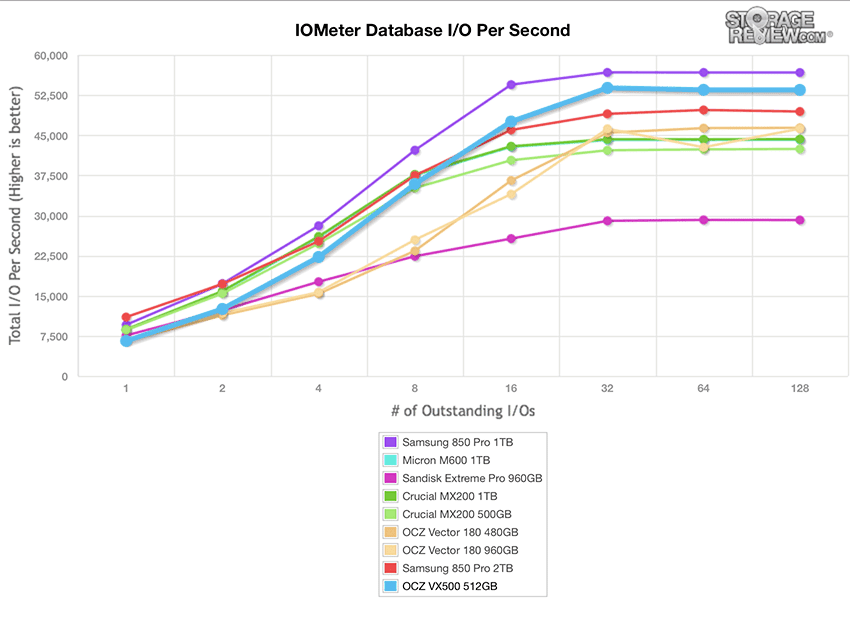
The next profile looks at a file server, with 80% read and 20% write workload spread out over multiple transfer sizes ranging from 512-byte to 64KB. The VX500 delivered a range of 40,83.96 IOPS and 30,693.12 IOPS, placing it just behind the Samsung 850 Pro 1TB, which had an IOPS of 31,513.95 in the terminal.
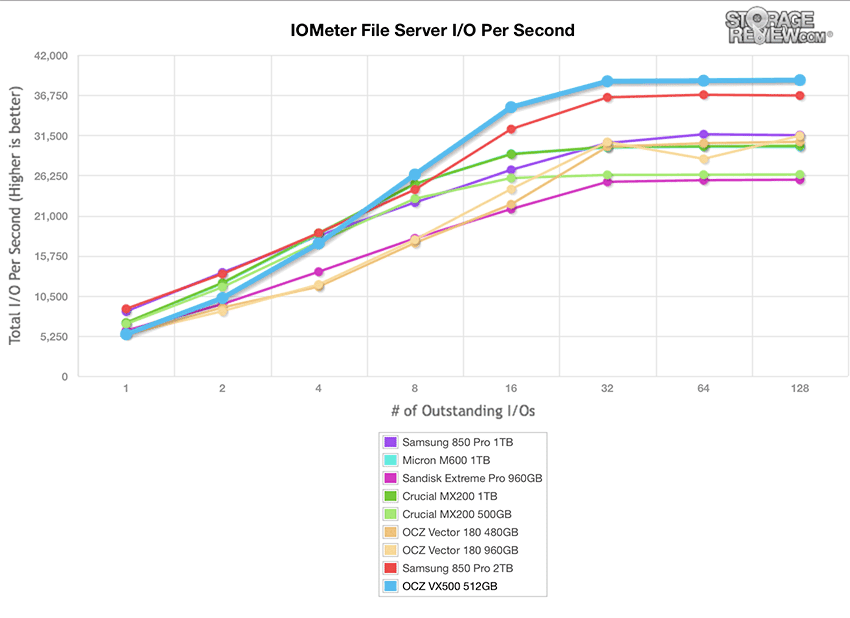
Our web server profile is read-only with a spread of transfer sizes from 512-byte to 512KB. The VX500 continued its excellent performance during our server mixed-workloads with an impressive range of 5,459.01 IOPS and 38,714.06, which was good enough for top spot among the leaderboard.
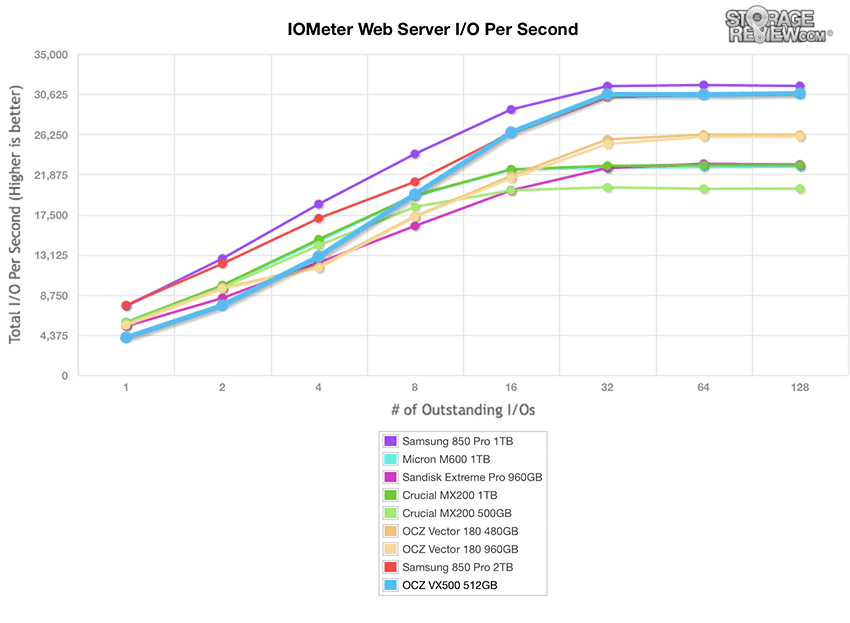
The last profile looks at workstation activity, with a 20% write and 80% read mixture using 8K transfers, where the OCZ VX500 512GB had a strong finish. Here, it posted a range of 6,348.66 IOPS and 53,727.5 IOPS for top honors among the comparables.
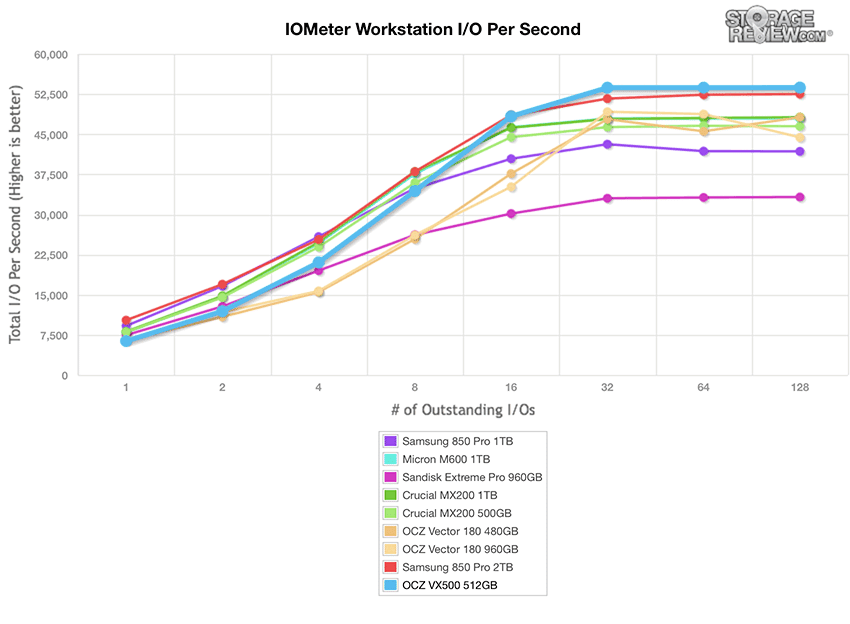
Consumer Real-World Benchmarks
For the average consumer, trying to translate random 4K write speeds into an everyday situation is pretty difficult. It helps when comparing drives in every setting possible, but it doesn’t exactly work out into faster everyday usage or better game loading times. For this reason we turned to our StorageMark 2010 traces, which include HTPC, Productivity, and Gaming traces to help readers find out how a drive might rank under these conditions.
The first real-life test is our HTPC scenario. In this test we include: playing one 720P HD movie in Media Player Classic, one 480P SD movie playing in VLC, three movies downloading simultaneously through iTunes, and one 1080i HDTV stream being recorded through Windows Media Center over a 15 minute period. Higher IOPS and MB/s rates with lower latency times are preferred. In this trace we recorded 2,986MB being written to the drive and 1,924MB being read.
In our HTPC profile, the OCZ VX500 512GB outperformed the other tested consumer drives quite handedly with an impressive 8,902.27 IOPS, 411.6MB/s and 0.786ms in average latency. The next best drive was the SanDisk Extreme Pro 1TB, thought it didn’t really come close to catching OCZ’s new drive.
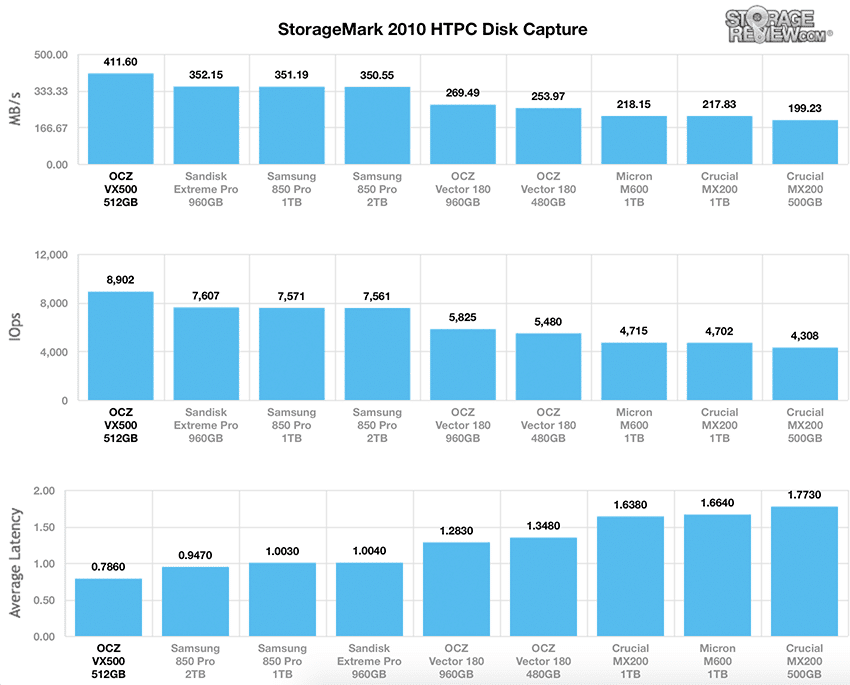
Our second real-life test covers disk activity in a productivity scenario. For all intents and purposes this test shows drive performance under normal daily activity for most users. This test includes: a three hour period operating in an office productivity environment with 32-bit Vista running Outlook 2007 connected to an Exchange server, web browsing using Chrome and IE8, editing files within Office 2007, viewing PDFs in Adobe Reader, and an hour of local music playback with two hours of additional online music via Pandora. In this trace we recorded 4,830MB being written to the drive and 2,758MB being read.
In our Productivity trace, though the OCZ VX500 lost its pole position to the Samsung 850 Pro 1TB, it gave us some great performance: 12,776.79IOPS, 376.55MB/s and 0.573ms in average latency.
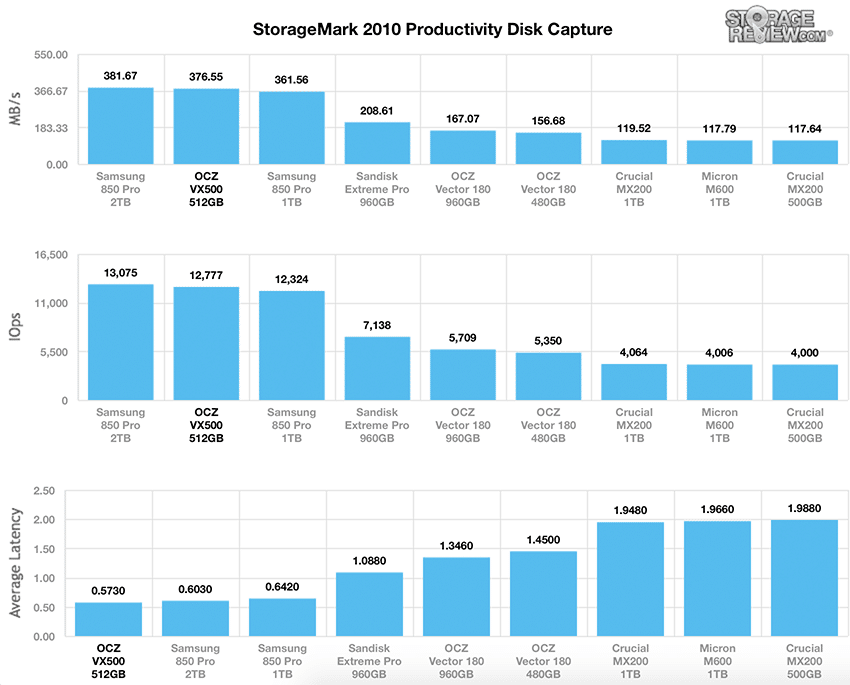
Our third real-life test covers disk activity in a gaming environment. Unlike the HTPC or Productivity trace, this one relies heavily on the read performance of a drive. To give a simple breakdown of read/write percentages, the HTPC test is 64% write, 36% read, the Productivity test is 59% write and 41% read, while the gaming trace is 6% write and 94% read. The test consists of a Windows 7 Ultimate 64-bit system pre-configured with Steam, with Grand Theft Auto 4, Left 4 Dead 2, and Mass Effect 2 already downloaded and installed. The trace captures the heavy read activity of each game loading from the start, as well as textures as the game progresses. In this trace we recorded 426MB being written to the drive and 7,235MB being read.
In our read-intensive Gaming trace, the VX500 was barely edged out by the two Samsung 850 Pro capacities, posting an impressive 9,238.07 IOPS, 485.19MB/s and 0.835ms in average latency.
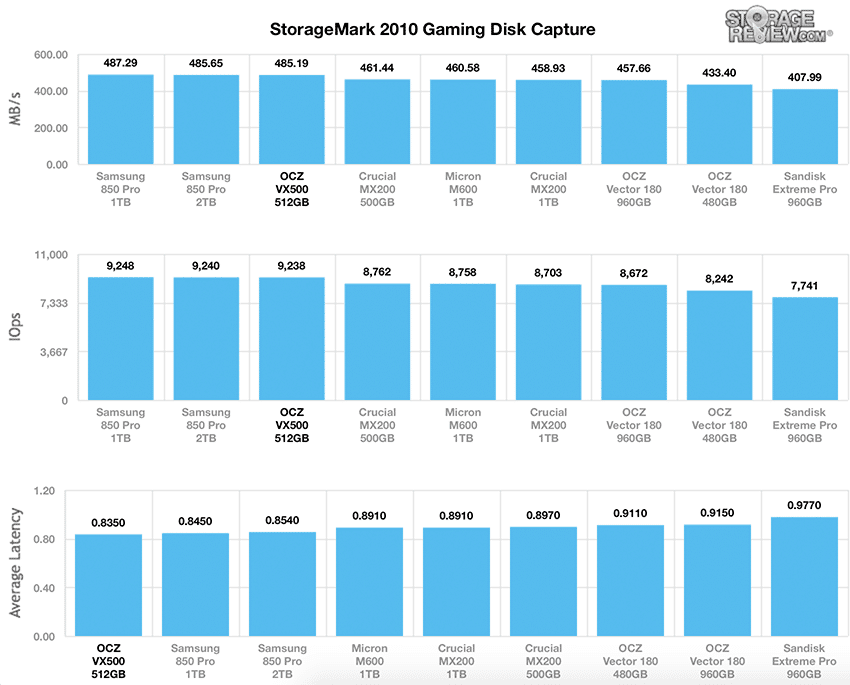
Conclusion
The Toshiba OCZ VX500 Series is a mid-range consumer SSD that offers users an effective and affordable way to upgrade their desktops or notebooks to solid-state technology without having to buy a lower performing entry-level drive. Touted as the direct replacement for their Vector 180 line, the VX500 offers good endurance coupled with a fantastic warranty plan. This competitively priced consumer SSD goes for a solid $0.30/GB for the 512GB offering, making the Toshiba’s VX500 a great addition to the OCZ portfolio of consumer drives. It certainly enables it to stand out in the crowded consumer SSD market.
Though its performance during our 4K tests was more or less forgettable (i.e. it was consistently near or at the bottom of the leaderboard), the VX500 certainly revealed itself as a powerhouse during our other benchmarks. This was highlighted by our server mixed-workloads, where it gave the best overall performance and was consistently the leader (or among the leaders). For example, in our database profile, the OCZ drive showed excellent results with an IOPS of 53,473.40 in the terminal, while delivering a range of 40,83.96 IOPS and 30,693.12 IOPS in our file server profile. Moreover, it finished very strong during our workstation activity benchmark, posting a range of 6,348.66 IOPS and 53,727.5 IOPS for top honors.
This excellent performance continued into our real-world consumer tests, which showed the drive at the top of our leaderboards in all three categories. During our HTPC workload, the OCZ VX500 easily outperformed the other tested drives with 8,902.27 IOPS, 411.6MB/s and 0.786ms in average latency. The OCZ VX500 showed another strong performance with our productivity trace, posting 12,776.79IOPS, 376.55MB/s and 0.573ms in average latency, while our read-intensive gaming trace recorded a notable 9,238.07 IOPS, 485.19MB/s and 0.835ms in average latency. This impressive real-world performance makes this a compelling choice for consumers looking to upgrade (even those who might already leverage SSD technology).
Pros
- Impressive mixed-workload and real-world performance
- Best-of-class warranty program
- Affordable capacity offerings
Cons
- Poor 4K performance
Bottom Line
The Toshiba OCZ VX500 Series is a solid addition to the company’s line of consumer drives, offering a blend of affordable price tag, great performance, and the company’s incomparable Advanced Warranty program.




 Amazon
Amazon